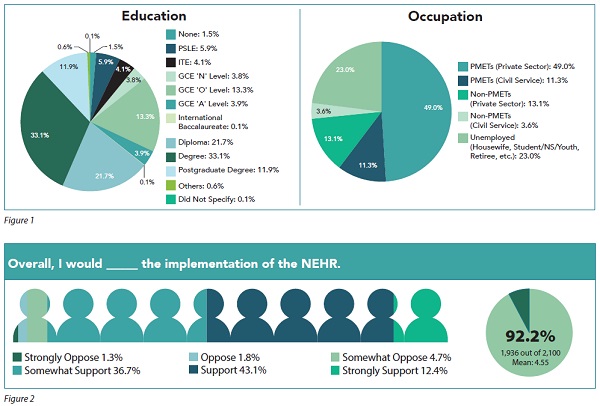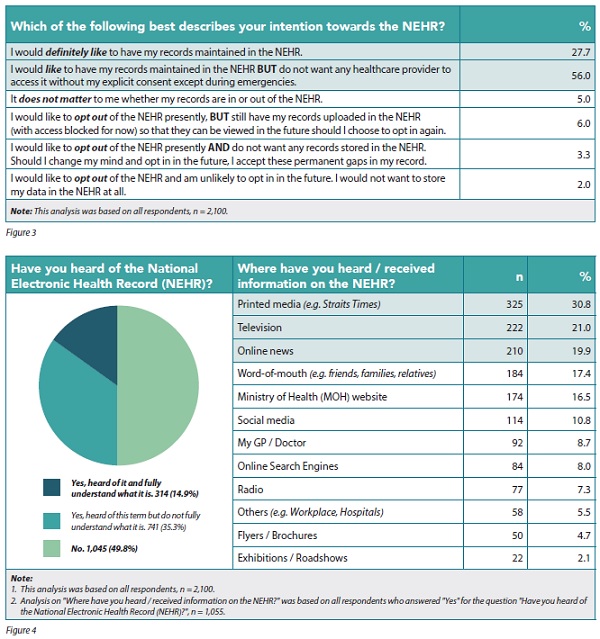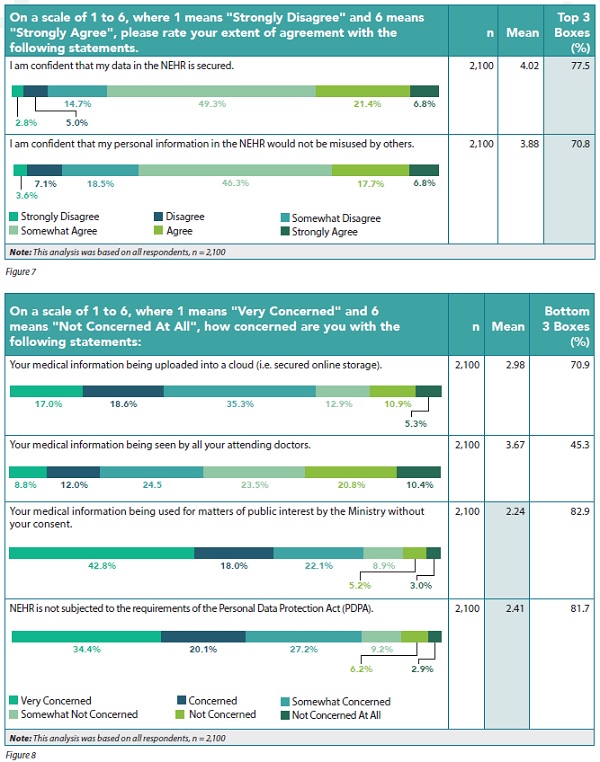"Singaporeans are generally supportive of the NEHR, and want more control over their data."
In early 2018, in reviewing the proposed Healthcare Services Act (HCSA), and the implications for the nationwide implementation of mandatory contribution to the National Electronic Health Record (NEHR), the College of Family Physicians Singapore, the Academy of Medicine Singapore and the Singapore Medical Association agreed to conduct a joint survey on the public sentiments towards the NEHR.
The objectives of the survey were to:
This survey was carried out over a six-week period from 9 March 2018 to 15 April 2018. A total of 2,100 responses were collected, comprising 2,000 online submissions and 100 face-to-face interviews. The face-to-face interviews were done to reach out to non-IT-savvy respondents aged 60 years and above, with these respondents being recruited in the town centres, key districts and heartland areas.
The subject pool comprised 90.4% (1,899 of 2,100) Singapore citizens, with 79.8% (1,676 of 2,100) living in public housing. 58.0% (1,217 of 2,100) were females, with the ethnic distribution being representative of the Singapore population (see Figure 1).
The summary of the results of the survey is as follows:
- We found that 1,936 of 2,100 (92.2%; "Somewhat Support" / "Support" / "Strongly Support") of the study cohort were supportive of the NEHR (see Figure 2).
- 581 of 2,100 (27.7%) definitely wanted to have their records maintained in the NEHR.
- 1,175 of 2,100 (56.0%) would like their records maintained in the NEHR but did not want any healthcare provider to access it without their explicit consent except during emergencies (see Figure 3).
- 314 of 2,100 (14.9%) were fully aware of the NEHR, and 1,045 of 2,100 (49.8%) had not heard of it at all. Awareness of the NEHR was lowest amongst those aged 21 to 29 year olds (62 of 170; 36.5%) and those above 60 years old (141 of 320; 44.1%) (see Figure 4).
- 1,979 of 2,100 (94.2%) of the respondents felt that their doctors would be able to make better informed diagnoses and decisions with the NEHR, and it would also raise patient safety (1,993 of 2,100; 94.9%) (see Figure 5).
- Majority of the respondents were willing to disclose general information, such as doctor's general diagnoses (1,719 of 2,100; 81.9%), allergies (1,661 of 2,100; 79.1%) and general medication history (1,629 of 2,100; 77.6%).
- However, when it came to "sensitive" information, the support was lower [medication history (1,061 of 2,100; 50.5%), laboratory and radiology results (946 of 2,100; 45.0%), doctor's more specific diagnoses (914 of 2,100; 43.5%) and operation/procedure notes (876 of 2,100; 41.7%)] (see Figure 6).
- 77.5% (1,627 of 2,100) of the respondents were confident that their data in the NEHR was secure, and 70.8% (1,487 of 2,100) were confident that their data would not be misused by others (see Figure 7). Nevertheless, there were specific concerns:
- 70.9% (1,489 of 2,100) were concerned about their medical information being uploaded onto a cloud (secured online storage).
- 82.9% (1,741 of 2,100) were concerned that their medical information would be used for matters of public interest by the Ministry without their consent.
- 81.7% (1,715 of 2,100) were concerned that the NEHR is not subjected to the requirements of the Personal Data Protection Act (PDPA) (see Figure 8).
In conclusion
- About half (1,055 of 2,100; 50.2%) of the respondents were aware of the NEHR, with 14.9% (314 of 2,100) "fully understanding" what NEHR is.
- More than 90.0% of the respondents agreed that with the NEHR, "their doctor(s) would be able to make better-informed diagnoses and decisions for the best course of treatment to improve their health" (1,979 of 2,100; 94.2%) and that "the NEHR would raise patient safety by enabling medical professionals to access critical medical information (e.g. name of medication prescribed, diagnoses) in an emergency" (1,993 of 2,100; 94.9%).
- Most of the respondents were confident that their data in the NEHR was secure (1,627 of 2,100; 77.5%), and that their data would not be misused by others (1,487 of 2,100; 70.8%). Nevertheless, there were still concerns with data confidentiality with regard to their "medical information being used for matters of public interest by the Ministry without their consent" (1,741 of 2,100; 82.9%) and that "NEHR is not subjected to the requirements of the PDPA" (1,715 of 2,100; 81.7%).
-
In a nutshell, while 92.2% of the respondents supported the implementation of the NEHR to varying extents, about a quarter of all the respondents (581 of 2,100; 27.7%) mentioned that they "would definitely like to have their records maintained in the NEHR". More than half of the respondents (1,175 of 2,100; 56.0%) "would like to have their records maintained in the NEHR but do not want any healthcare provider to access it without their explicit consent except during emergencies".
The survey results have helped us to better understand the public perceptions of the NEHR, and the sensitivities regarding the privacy and confidentiality issues of personal medical records that concern the members of the public. With this insight, we hope that it will help to shape how the NEHR will develop especially in the light of the forthcoming HCSA.
Ministry of Health's Statement on the Joint Public Sentiment Survey on NEHR by AMS, CFPS and SMA
The Ministry of Health (MOH) would like to thank the Academy of Medicine, Singapore (AMS), College of Family Physicians Singapore (CFPS) and Singapore Medical Association (SMA) for providing additional valuable feedback on the National Electronic Health Record (NEHR).
The survey validates much of the feedback that we had gathered during MOH's public consultation sessions in early 2018 from various stakeholders, including current and prospective licensees, professional bodies, and members of the public.
The survey indicates broad support for the NEHR as an enabler to facilitate care continuity as patients move across healthcare settings. We are also heartened that respondents agreed that the NEHR will raise patient safety by enabling medical professionals to access critical medical information during emergencies.
The survey findings reiterate concerns similar to those raised during the public consultation, such as patient confidentiality and data security. MOH plans to enact legislations to protect patients' healthcare data and usage in NEHR.
As patient confidentiality is of utmost importance to us and in view of the recent major cyberattack on SingHealth's database, MOH has directed the Integrated Health Information Systems (IHiS) to conduct a thorough review of the robustness of the cyber safeguards of our key IT systems. These include the NEHR, which is different and separate from the affected system at SingHealth. While we conduct this review, we will take a pause on our plans on mandatory contributions of healthcare information to NEHR. This will allow us to review and strengthen our cybersecurity measures where necessary before proceeding.
MOH recognises that doctors and dentists, as future users of NEHR, play a critical role in ensuring that electronic medical records are used safely, effectively, and ethically for the benefit of our patients. We thank AMS, CFPS, and SMA once again for sharing their survey findings with us.




